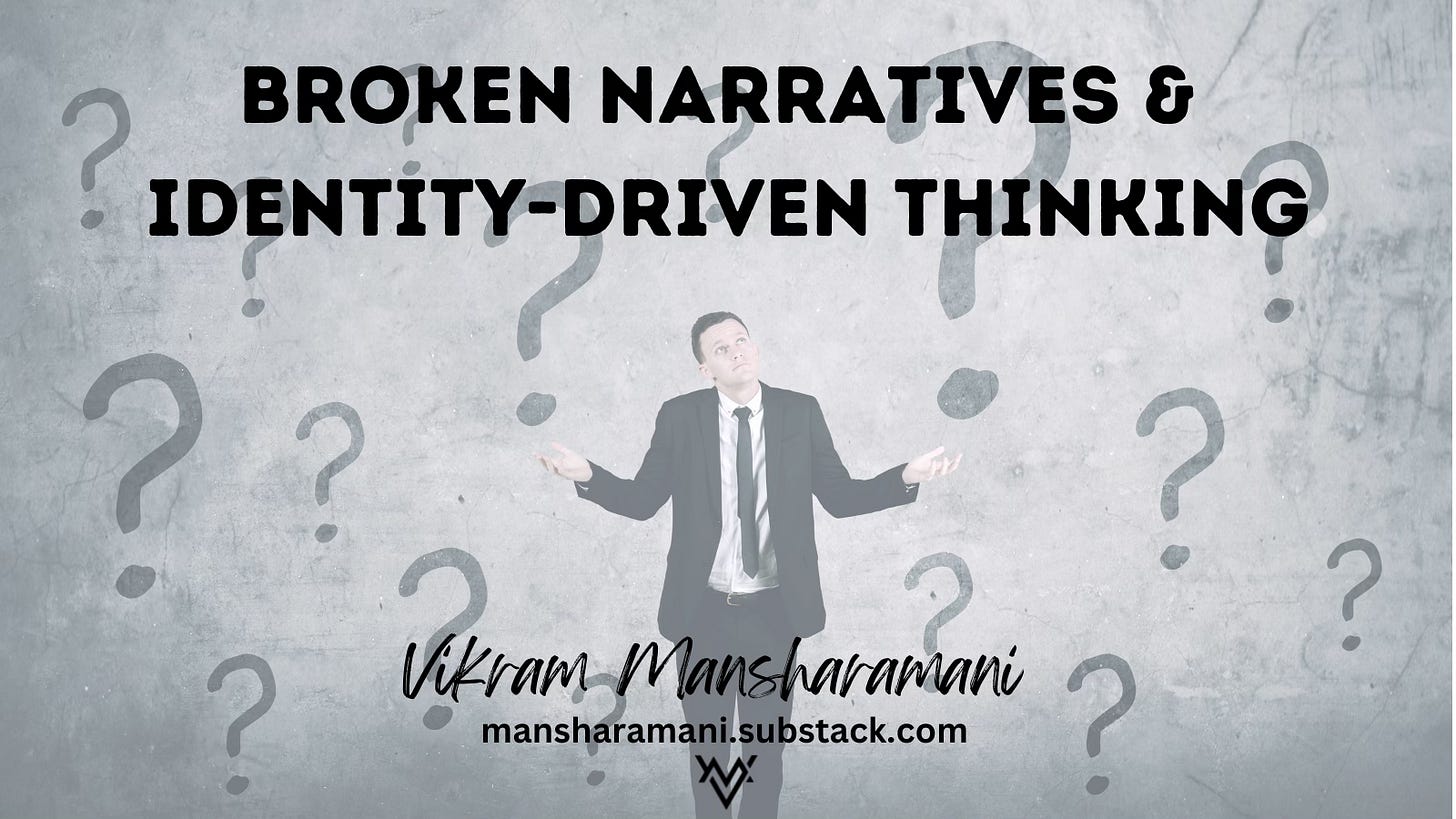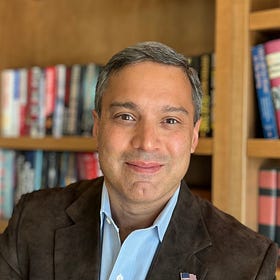Broken Narratives & Identity Driven Thinking
Why recent outrage over elite university leadership points to better times ahead
In the past few days, I’ve received notes from people around New Hampshire and the country, many of whom I had interacted with during my campaign or in the course of my consulting work. Many asked if I was happy to see the presidents of Harvard, MIT and UPenn getting crucified in front of Congress. Others asked if I felt vindicated. These messages were all referring to the fact that my 2022 campaign for the US Senate in New Hampshire contributed to the ending of my time on faculty of Harvard University
My answer to these inquiries has been consistent: I’m horrified by what happened last week and I find no joy in seeing moral confusion among the leaders of some of America’s most prestigious universities.
And then, over this past weekend, I had the opportunity to connect with a former colleague who had recently moved to a new position. I hadn’t spoken with him since last summer. He summarized (in straightforward language) the cognitive dissonance he and others in academia apparently felt when I announced I was running for the US Senate as a Republican.
Vikram, you’re the son of two working class immigrants! You didn’t grow up rich or privileged in anyway. You were a scholarship kid and managed to do really well in school. Heck, you even went on to get a PhD from MIT and then taught at both Harvard and Yale. All of that means to many of us that you’re a Democrat, not a Republican. We simply couldn’t digest the possibility that you were not one of us. It felt like a betrayal, it forced us to confront a reality that we didn’t want to believe, namely that our own perspectives were not universal. You don’t fit the narrative. I’m sorry I too fell into that trap and dismissed you just like others did.
Another friend texted me a short, but powerful, message: “I concede you were right about higher ed all along.” While I may or may not have been “right” about the cancerous culture on campuses across America today, I remain convinced that a focus on identity politics and the labeling of humans according to skin color or sexual orientation is counterproductive. It’s diversity of perspective, not identity, that we should seek. In fact, during my campaign for the US senate, I wrote an opinion piece for the Concord Monitor about this very subject, which you can read by clicking on the link below:
Unify, don’t separate America
Vikram Mansharamani lives in Lincoln and is a candidate for U.S. Senate. Having taught at Harvard for the past five years and Yale for the eight years prior to that, I’ve had a front-row seat to watch the evolution of our culture on campus. And let me be blunt, it’s disturbing.
The testimonies of Harvard University’s Claudine Gay, the University of Pennsylvania’s Liz Magill, and MIT’s Sally Kornbluth in front of Congress were shocking to many of us. Representative Elise Stefanik of New York, a member of the House Education Committee led by Representative Virginia Foxx of North Carolina, completely exposed the ludicrous nature of the rehearsed, lawyer-approved positions of the University leaders. If the subject weren’t so deadly serious, one might laugh at the disconnect between their thinking and common sense.
All three presidents confirmed their “personal” discomfort with recent antisemitism but went on to describe their commitment to free speech. (It was as if they had all been coached by the same lawyer…perhaps they were?) When asked whether the universities would do anything if such speech called for the genocide of Jewish people, Claudine Gay’s answer left me speechless. I’m paraphrasing, but her answer was basically “only if it translated to action” and thereby became harassment or bullying. My translation of Ms Gay’s comments: “if someone is calling for genocide, it’s free speech until genocide is committed.” Having majored and taught classes in Ethics, Politics, & Economics, I was stunned by the lack of moral clarity on full display.
For those that have followed me for some time, you’re aware that I spent four years at Yale University as an undergraduate and then four and a half years at the Massachusetts Institute of Technology as a graduate student. I then served on the faculty of Yale University for almost eight years and then spent five years on the faculty of Harvard University. I have won teaching awards and was even helping Harvard raise money for a Professor of Practice position that I would potentially fill.
Yet my time as a teacher and member of the faculty at Harvard came to an abrupt end during the summer of 2022 when I was de facto cancelled by Harvard, an experience I chronicled for the New Hampshire Union Leader and encourage you to read by clicking on the link below:
I Was Canceled
THE IDEALS of the American Revolution are being replaced by a cultural revolution that is tearing America apart. Its foot soldiers push a new orthodoxy — a new state religion, really — one that tears down statues of George Washington, teaches our kids that America is racist, and tells them they should pick their genders.
So What?
The recent rise of antisemitism on and off campus has warped victimhood in unintelligible ways. I feel like I have entered some bizarro world in which those who were slaughtered (the actual victims) are called aggressors while terrorists have claimed the mantle of victimhood. At the roots of this distorted reality is identity-driven thinking, a logic that creates a hierarchy of grievances, an approach to making sense of the world that has been broadly embraced in most academic institutions.
It’s become commonplace and acceptable to discuss genocide and the elimination of an entire people (without ramification). And if that doesn’t disturb everyone, just think about how such behavior has been normalized in elite academia and perpetuated to the next generation of leaders. If universities are unwilling to call such behavior what it is — dangerous and inappropriate hate speech — then what hope do we have that tomorrow’s leaders will have any moral compass?
At the time I wrote these pieces, friends, family, and many acquaintances accused me of exaggerating my concerns with campus culture for political gain. Many refused to consider the possibility that I may have shed light on a disturbing dynamic that seemed, at the time, to be getting worse. Identity politics and competitive victimhood were running roughshod over American ideals. Right and wrong had been lost in a sea of relative thinking. This is now obvious to anyone who watched the testimony.
My Teaching Philosophy
My teaching philosophy is organized around a core belief that higher education must teach students to think critically about the information and analysis that they consume. I also h…
As a student of financial bubbles who has spent decades thinking about herd behavior and mass popular delusions, I have a strong sense that the identity-driven thinking bubble is bursting. And while the campus culture that has produced these crazy dynamics may take decades to change, the process has begun. The pendulum has swung too far, and in that regard, seem increasingly likely to swing towards transparency, accountability, and competition. This would be a healthy change.
It’s time for America’s leading universities, as noted by Fareed Zakaria, to “abandon their long misadventure into politics, retrain their gaze on their core strengths, and rebuild their reputations as centers of research and learning.” It’s time for them (and America) to acknowledge the many flaws of identity-driven thinking and revert to a focus on excellence and achievement.
ICYMI: Last week I endorsed Nikki Haley. Click below to read my thinking:
Haley Will Make America Strong Again
Over the past few months, I’ve traveled extensively and have spent time on the ground in Australia, Hong Kong, Panama, Colombia, Canada, the United Arab Emirates and Brazil. Over the course of those travels, it’s become crystal clear to me that America faces a set of foreign policy challenges unlike those of the past. American weakness has destabilized …
About Vikram Mansharamani
Vikram Mansharamani is an entrepreneur, consultant, scholar, neighbor, husband, father, volunteer, and professional generalist who thinks in multiple-dimensions and looks beyond the short-term. Self-taught to think around corners and connect original dots, he spends his time speaking with global leaders in business, government, academia, and journalism. LinkedIn has twice listed him as its #1 Top Voice in Money & Finance, and Worth profiled him as one of the 100 Most Powerful People in Global Finance. Vikram earned a PhD From MIT, has taught at Yale and Harvard, and is the author of two books, Think for Yourself: Restoring Common Sense in an Age of Experts and Artificial Intelligence and Boombustology: Spotting Financial Bubbles Before They Burst. Vikram lives in Lincoln, New Hampshire with his wife and two children, where they can usually be found hiking or skiing.








